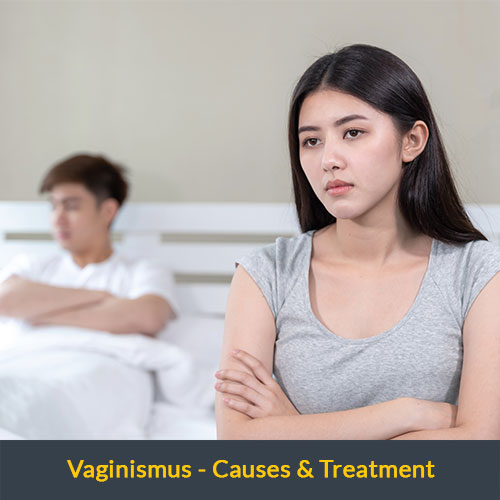Contents
What is Vaginismus?
Vaginismus is a condition in which the vaginal muscles contract involuntarily, causing pain and penetration difficulties. It can be mild, or severe. Vaginismus may make intercourse impossible or extremely painful. It may also make inserting a tampon difficult or impossible.
Vaginismus is not caused by anything physical but it is a psychological condition. Vaginismus may be caused by fear of pain, fear of vaginal penetration, or a negative association with sex. Vaginismus is treatable with counseling, sex therapy, and/or pelvic floor muscle training.
Types of Vaginismus:
There are three different types of Vaginismus: primary, secondary, and global.
Primary Vaginismus:
Primary vaginismus is when a woman has never been able to have penetration of any kind. This can be with a tampon, finger, or penis. Vaginismus is often (but not always) accompanied by sex pain, burning, and a sensation of tightness
Secondary Vaginismus:
Secondary Vaginismus is when a woman experiences vaginal tightness after previously being able to have pain-free intercourse. The causes of Secondary Vaginismus can be physical (such as scarring from childbirth or surgery) or psychological (such as anxiety or depression).
Global Vaginismus:
Global Vaginismus is the most severe form of Vaginismus and is characterized by a complete involuntary contraction of the vaginal muscles. This results in the inability to allow any sort of penetration – sexual or non-sexual – into the vagina. Global Vaginismus is often accompanied by a fear of penetration, pain during penetration, and/or an aversion to sexual activity.
Causes of Vaginismus:
There are a variety of different causes that can contribute to Vaginismus, including:
Psychological factors: Vaginismus has been linked to psychological factors such as anxiety, stress, depression, and past sexual trauma.
Physical factors: Physical factors that can contribute to Vaginismus include vaginal dryness, tightness of the vaginal muscles, and pelvic floor dysfunction.
Relationship problems: Vaginismus can also be caused by relationship problems, such as communication difficulties, performance anxiety, or a lack of intimacy.
Diagnosis of Vaginismus:
Vaginismus is often undiagnosed or misdiagnosed because many women do not seek medical help. Furthermore, health care providers may not be familiar with the condition. Vaginismus can only be diagnosed by a healthcare provider after a thorough physical and psychological evaluation.
During the physical examination, the healthcare provider will check for any structural abnormalities that could be causing the pain. They will also assess the pelvic floor muscles to see if they are tight or spasm.
The psychological evaluation will aim to identify any psychological factors that may be contributing to the condition. This may include exploring any past trauma, relationship issues, or anxiety disorders. Vaginismus is often comorbid with other conditions such as anxiety disorders, depression, and post-traumatic stress disorder.
Symptoms of Vaginismus:
The most common symptom of vaginismus is pain during intercourse. This is because the muscles around the vagina tighten up, making penetration impossible or very painful. Other symptoms can include:
- Difficulty using tampons
- Pain during sexual intercourse
- Discomfort during a gynecologic exam
- Burning or stinging sensations in the vagina
- The feeling of tightness in the vaginal opening
- Fear of losing control of bladder or bowel function during sex
If you’re experiencing any of these symptoms, Vaginismus could be the culprit. Talk to your doctor about treatment options.Once vaginismus has been diagnosed, treatment can begin.
Treatments of Vaginismus:
There are a few different ways that vaginismus can be treated. Vaginismus is a condition where the vaginal muscles tighten involuntarily, making sex painful or impossible. The good news is that vaginismus is treatable! Here are a few different treatment options:
Pelvic floor physical therapy: This type of therapy can help to relax the vaginal muscles. A physical therapist will teach you exercises and stretches to do at home.
Botox injections: Botox can help to relax the vaginal muscles and make sex less painful.
Surgery: In some cases, surgery may be necessary to loosen the vaginal muscles. This is usually a last resort option.
If you’re struggling with vaginismus, don’t despair! There are treatment options available that can help. Talk to your doctor about which option may be right for you. Vaginismus is purely controlled by the brain and on autopilot when all your vaginal muscles spasm. Vaginismus is hard-wired in your subconscious mind deep within the flight or flight responses lives.
Advanced Vaginismus Therapy understands why your Vaginismus is happening and what is needed to help you break free of Vaginismus. Advanced Vaginismus Therapy has been helping women all over the world since 2013, in the comfort and privacy of their very own homes via Zoom. Advanced Vaginismus Therapy gets results just after one session without using any type 0f medications or surgery!
Advantages of Our Treatments:
- No Medication
- No Surgery
- No Invasive Therapy
- No Botox
- No Embarrassing Treatment
- No Medication Addition
- No Waiting for Medication to work.
- Fast Results, they will be either cured or have major improvements in just 1 session.
Get your FREE Strategy call for more information.

